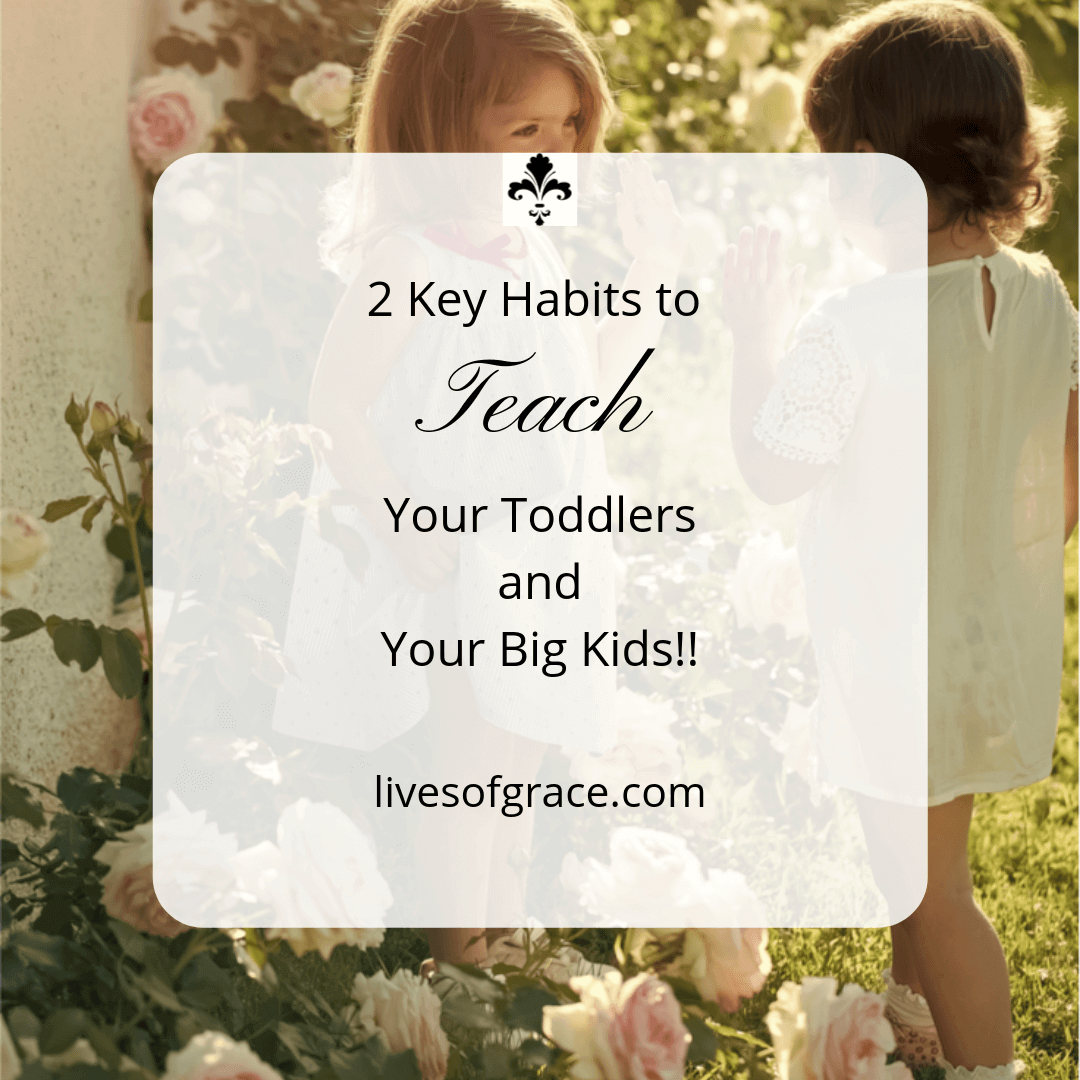There’s a lot of parenting advice out there about what to teach toddlers and what will make a happy child. With my seven children now grown, I have a different perspective about what is really important when raising children, than when I was a young mom in the middle of the battlefield. (All friendly fire, but sometimes days could be brutal!) Here are two parenting tips that I think are critical for a happy home.
Teaching Toddlers Empathy
When my oldest son, now 31, was in pre-school, his teacher gave me an article about the importance of empathy. It was a parenting-style changing moment. Before then, I had never thought much about empathy or the importance of teaching the virtue to my children. I thought that, like so many other virtues, you either had it or your didn’t. Sometimes we forget, our children come into the world knowing next to nothing – it is their instincts that let us know their needs. Certainly it is true that some children’s natural tendencies move them towards certain virtues, but it is our beautiful privilege to nurture and tend the virtues that don’t come easily.
After reading the article, I realized you CAN teach a child to be empathetic – to see the world from another’s eyes. Empathy is understanding and being aware of, or being sensitive to, the feelings of another without actually having the feelings yourself. Teaching empathy helps our children – at any age – to connect with the feelings and needs of others.
- When children are playing and a child gets hurt, help your child to be proactive and ask if they’re ok rather than ignoring the hurt child.
- If your child takes a toy away from another child or sibling, instead of simply saying, “You need to share”, help your child put themselves in place of that other child, and ask how they would feel if a toy was taken from them.
- If you have a sassy child, instead of always saying, “Talk nicely”, tell them that it hurts people’s feelings when they are spoken to rudely.
- Encourage your child to be the one to seek out the new kid in the play group, neighborhood or classsroom.
- Phrases to help: “When you treat your brother like that it hurts his feelings (or makes him angry).” “When you disobey me, it makes me sad that you do not respect me.” “What could you do to be kind to the new girl in your class?” “How do you think that makes him feel?”
Empathy developed in early childhood will go a long way during the difficult teen years when so many are just cruel to each other. Rather than a survival of the fittest mentality, we want to teach our children to be concerned about the weak and struggling – to be kind to all. The more children can imagine how they would feel, the more they will be compassionate, forgiving, and generous to others.
Teaching empathy in children can begin as early as 1-2 yrs. old. They may not completely understand what you’re asking, but you’ll be in the habit of calling their attention to the feelings of others, and they will begin the habit of considering the feelings of others.
Modeling empathy for our children is an even better tool than only talking about it. Let them see you consider other’s feelings; make meals for new moms, help elderly navigate shopping aisles – all the while explaining to your children how you think the recipients might need help or appreciate being thought of.
If you don’t naturally have a virtue that you’re trying to teach your children, no worries. Your children will benefit greatly from watching their mom also work at developing virtues.
Teaching Toddlers Order
The idea of you teaching your child order may be an uncomfortable feeling if you lack order yourself. In this world, where we have SO MUCH STUFF, it is hard for us to have this incredibly important virtue.
Order in a child’s self-care –
- Have a set time for meals and snacks – not whenever they want to pull out food (usually because of boredom). This also helps keep the home clean!
- Self-care routines –
- Morning routine: When the children get out of bed, teach them to turn around and make the bed immediately. After breakfast, teach them to clean up dishes, brush teeth, and put pjs away.
- Daily Routines: Exercise, structured and consistent quiet time each day, reading time, consistent bedtime
Order in home care –
- No food outside the kitchen – again, keeping the rest of the home clean
- Set times in the day when you pick up (before naps or if your children are older, before entertainment)
- Chores are done first thing. Put items away where they belong. Clean up after themselves. Impress upon the children from the time they’re toddling that it is their home too – You’re not the maid! (Spoken as lovingly as possible….and sometimes it’s not possible!) Everyone contributes to the care of our home.
What do you do with “I don’t want to”? Remember you’re the mom and you’re teaching them a critical skill that they’ll need for the rest of their life. So…no options for opinions from your children. Would it be ok for an adult to not brush their teeth some days because they didn’t want to?
Order in how your child spends their day –
- Most important order of the day – a consistent sleep schedule including naps until they are 3-4 yrs. Then quiet time, in their rooms reading or quiet, calm play. Insist upon it. You are the boss not your 2 yr old who says they don’t want to nap or have quiet time.
- Outside time is critical to those little bodies. There are many interesting studies questioning whether the rise of ADHD is because our children aren’t running around outside anymore. I’m not suggesting it will solve all problems, but it will help burn off all that distracting energy and make them happy!
- Order with schoolwork. If your children are in school, make sure that after a brief snack/downtime when they get home, the homework is first priority – don’t leave it until later in the evening.
- Restrictions on computer/TV/video games activities. Teach your children to entertain themselves during the week, with a movie night on the weekend. Be vigilant in restricting TV shows that are contrary to the values you’re teaching in your home.
Setting the Tech Tone
Of course, we must set the tone by limiting the amount of technology we let into our day. When I was raising my children, I did not have a cell phone or cable tv. I survived – with a lot less anxiety, stress and distraction, and I didn’t need to know what was happening at every minute of the day. I understand that the world has changed, but ask yourself if what you see on your phone during the day is really that important or is it just a distraction? Can you check it once or twice a day, rather than all day long?
Order in faith life–
Above all, teaching your children to have an active faith life is the first order of the day. If actively praying throughout the day is not something you are doing, then you can teach them while challenging yourself to keep God first in mind and heart.
- Daily morning offering – thanking God for a new day, and asking Him to help you live it well
- Prayers before meals – simple blessing, said together, before each meal
- Prayers in the evening – praying together as a family, teaching your child to be in relationship with God and aware that every blessing comes from Him, and every sorrow can be soothed and comforted by Him.
Empathy and order are not the only habits that children need to be happy. However, if you can begin developing these two habits when they are toddlers, you’ll be on your way to developing happy, kind, orderly children that will contribute to the peace and joy of the home.
Do you have ways or techniques that you use to help your children with empathy or order? Please share and comment below!!
Have a great day!
Janet




No Comments